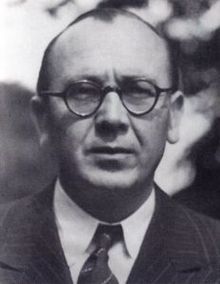Kurt Diebner
| Kurt Diebner | |
|---|---|

Kurt Diebner (1905–1964)
|
|
| Born |
May 13, 1905 Obernessa, Weißenfels, German Empire |
| Died | June 13, 1964 (aged 59) Oberhausen, West Germany |
| Residence | Flensburg, West Germany |
| Citizenship | Germany |
| Nationality | German |
| Fields | Nuclear Physics |
| Institutions |
Physikalisch-Technische Bundesanstalt Reichswehrministerium Reichskriegsministerium Army Ordnance Office University of Göttingen Max-Planck Gesellschaft |
| Alma mater |
University of Halle-Wittenberg University of Innsbruck |
| Doctoral advisor | Gerhard Hoffmann |
| Known for | German nuclear program |
Kurt Diebner (13 May 1905 – 13 July 1964) was a German nuclear physicist who is well known for directing and administrating the German nuclear energy project, a secretive program aiming to build nuclear weapons for Nazi Germany during the course of World War II. Diebner was the administrative director of the German nuclear program after Adolf Hitler, Führer and Reich Chancellor, authorized this program.
Diebner also served as the director of the Nuclear Research Council and a Reich Planning Officer for the German Army until its surrender to Allied Powers in 1945. After the war, Diebner was incarcerated in the United Kingdom and repatriated back to West-Germany in early 1946. Shortly after his return, Diebner became director and joint owner of DURAG-Apparatebau GmbH and he was a member of the supervisory board of the Gesellschaft zur Kernenergieverwertung in Schiffbau und Schiffahrt m.b.H
Diebner was born in 1905 in Obernessa, Weißenfels in German Empire. From 1925, Diebner went on to study Physics at the Martin Luther University of Halle-Wittenberg where he gained B.S. in 1928, and M.S. in Physics from Leopold Franzens University of Innsbruck in 1930. He completed his doctorate in 1932 under Gerhard Hoffmann in Halle. His thesis was on column ionization of alpha particles.
...
Wikipedia
